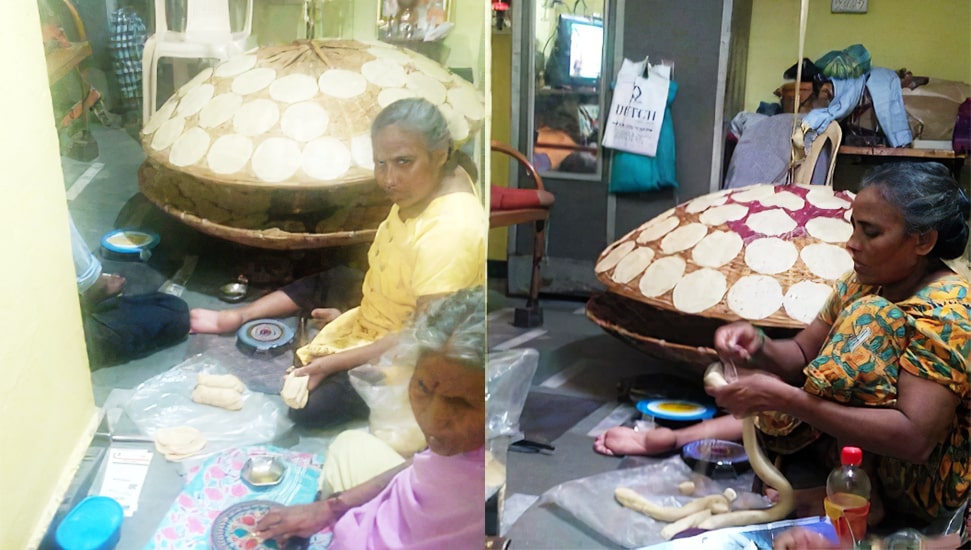Savitri was born and raised in Dharavi and lives there with her parents. Touted as the world’s largest slum, Dharavi is home to approximately 1 million people and 15,000 single-room factories. It has the highest population density of 0.34 million per km2. Most of Dharavi’s 55,000 dwellings are 1-room tenements no larger than 100 sq. feet, with very dim lighting, and negligible ventilation. Characterised by industriousness and a fully integrated manufacturing ecosystem for leather, garment, metal, food and recycling industries, it is the breathing heart of Mumbai city.
Savitri was 12 when she first rolled her first papad. Her locomotor disability excludes her from better-paid employment, as her prospects are highly limited. After forty years of making papads, she feels like this is the only work she has ever known. She is differently-abled, but nothing comes in the way of her being independent. Savitri goes to Mumbai’s Charni Road suburb (15 kms away) by the local train, to pick up the papad dough from a famous company. A single journey just to bring home the dough can take up to two hours. After bringing the dough back home, Savitri uses a lot of muscular strength to evenly knead it, as the stiff dough is not easily moulded. After several pressure strokes, she must then pull the dough in different directions to make long cylindrical tubes. The long tube is then cut into small even-sized pieces and rolled into balls. The balls are then flattened by applying even pressure on all sides until each one is a perfectly thin roundel, i.e. a papad.
After rolling into discs, the papads need to be sun-dried. During the summer months, the papads are laid on old sarees or cane baskets outdoors in the hot sun. No costs involved in the drying process. But during the monsoon months when it rains, and during the winter months when there is hardly any sun, Savitri has to incur the costs of drying the papads inside the four walls of her home. These costs include: kerosene (used in stoves) and electricity (used for fans). Savitri has to foot these additional costs herself, as the papad company does not pay or reimburse her for these.
Nor do they pay for the usual papad-making costs incurred by Savitri such as oil, thread, metal rolling boards, wooden rolling pins and large baskets as basic tools for their work. If the payment was decent and included these extra costs, it would be okay, she says, they would manage somehow. But with paltry income for all the hard work and long hours, plus no reimbursement of material costs, transport costs, and exigency costs during non summer months; she ends up with almost no income.
Commuting to pick up the dough and dropping back the finished products takes 4 hours. Add to that, the actual papad-making process which requires 7 hours (11am-6pm) per day, which results in 6 kilograms worth of papads (with each kilogram fitting approximately 100 pieces). Therefore, Savitri makes a minimum of 600 papads every day for which she earns Rs. 200. The help of her elderly parents accounts for unpaid family labour.
When the COVID-19 pandemic hit, Savitri’s work orders stopped completely and indefinitely. The sudden stoppage of work made her vulnerable. None of the informal working poor like Savitri, are always trying to find new prospects, exercise their agency to earn an honest day’s wage, and live with dignity. Mainstream narrative of public and media often paints them as parasites, but this couldn’t be further away from the reality. After days of looking around, she finally found a company in the close-by suburb of Bandra, which helped her resume papad-making. Here too, she makes her usual 6 kgs rolled papads in a day, but for much less — almost half of the other company. She feels sad about it.
She reminisces of the golden age when she would get a loyalty performance bonus every Diwali from her previous employer, but is quick to emphasise that she considers herself fortunate to even have work in these Covid-infested times, when thousands of others are unemployed. These are also her closing words for our interview, ‘the government should make sure that we have work every single day, and that there is sufficient food for us.’ While she hopes for some financial assistance and support from the government on account of her locomotor disability, she pessimistically notes that she does not believe it will do anything for her.



